Ottawa, Canada - The Inter-American Institute for Cooperation on Agriculture (IICA), in collaboration with the International Fund for Agricultural Development (IFAD) and the Central American Integration System (SICA), recently hosted an insightful workshop, "Agritourism: A Strategic Pathway to Development in Central America and the Caribbean". The event showcased the potential of agritourism, a unique blend of agriculture and tourism that offers visitors an immersive and educational experience in rural settings. It's a dynamic and transformative form of travel that not only connects people with the land but also fosters a deep appreciation for local culture and heritage.
This hybrid workshop, held at the Canada Agriculture and Food Museum, facilitated both in-person and online attendance and offered live interpretation in English, Spanish, and French, making it accessible to a diverse audience. The event successfully drew 163 participants, including ambassadors from El Salvador, Costa Rica, Honduras, Guatemala, Panama, and the Dominican Republic, emphasizing the growing relevance of agritourism in these regions.
|
“Central to the workshop's objectives was the promotion of a collaborative environment among stakeholders from various sectors. The event not only spotlighted the potential of agritourism in economic and cultural development but also laid the groundwork for future collaborations, policy development, and strategic initiatives within the agritourism sector across Central America and the Caribbean.” |
For those interested in exploring the complete discussions, recordings of the event are available on IICA Canada's YouTube channel, offering accessibility in English, French, and Spanish.
A Glimpse into Agritourism's Bright Future in Central America and the Caribbean
The workshop opened with remarks from Dr. Jean Charles Le Vallée, IICA Canada Representative, and Kerry-Leigh Burchill, Director of the Canada Agriculture and Food Museum. Dr. Le Vallée emphasized agritourism's role as a post-COVID development solution, especially relevant in the Caribbean and Central America. Ms. Burchill connected the event to the International Day for the Eradication of Poverty, underlining the importance of collaborative and sustainable discussions in the current global context.
Keynote speeches from distinguished speakers shed light on the economic importance of agritourism and how agritourism could reduce poverty, support local businesses, and bolster economic growth in the region.
His Excellency Ricardo Cisneros, representing SICA, emphasized agritourism's role in sustainable development. He highlighted the region's rich biodiversity and cultural heritage, advocating for collaborative efforts and policy support to maximize agritourism's benefits.
Ms.Rossana Polastri of IFAD highlighted the post-pandemic tourism boom in Central America, emphasizing its pivotal role in the region's economies. She focused on agritourism's potential for rural development and its alignment with farm-to-table trends, advocating for youth engagement and digital connectivity in promoting cultural heritage.
Ms. Sandra Carvao, representing UNWTO (United Nations World Tourism Organization), offered a global perspective on agritourism. She highlighted initiatives like UNWTO's "Best Tourism Villages", emphasizing the need for innovative approaches to agritourism that enrich experiences and deepen interactions between producers, hospitality, and tourists.
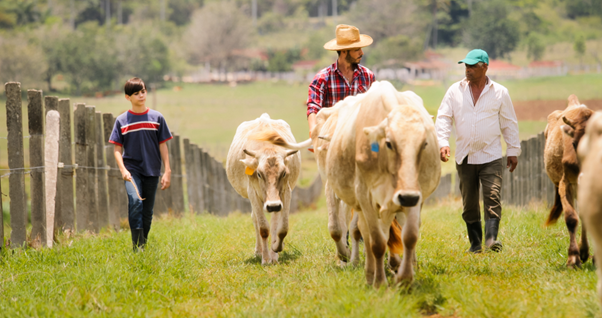
Diverse Perspectives on Agritourism
|
Shauna Brandon, Rural Development Specialist at IICA Jamaica, shed light on the Caribbean's tourism sector's adaptability and the growing need to intertwine agriculture with tourism more effectively |
The workshop featured two panels. The first, "Beyond the Beach: Exploring Agritourism Opportunities in the Caribbean," delved into the untapped potential of agritourism in the Caribbean, moving beyond traditional beach tourism.
Caroline Morrow from BANNIKIN, a consultancy specializing in niche tourism development, pointed out the evolving preferences of visitors who now seek transformational travel encounters that promise personal growth and enrichment. Furthermore, she delved into the growing consumer desire to support local businesses, emphasizing how this aligns seamlessly with the principles of agritourism.
Shauna Brandon, Rural Development Specialist at IICA Jamaica, shed light on the Caribbean's tourism sector's adaptability and the growing need to intertwine agriculture with tourism more effectively. She delved into the hurdles that must be cleared, notably enhancing the quality and regularity of local agricultural produce, refining the supply chain logistics, and encouraging hotels to prioritize local sourcing. Tackling these issues, she underscored the importance of fostering open communication between the hospitality and agricultural industries, gaining a clear understanding of product requirements and crop seasonality, and educating chefs about the advantages of incorporating local ingredients. From the agricultural perspective, she highlighted crucial factors like advanced farming techniques, ensuring food safety, establishing produce traceability, managing post-harvest processes, and optimizing supply chain systems to streamline the transportation of goods from rural farms to hospitality establishments.
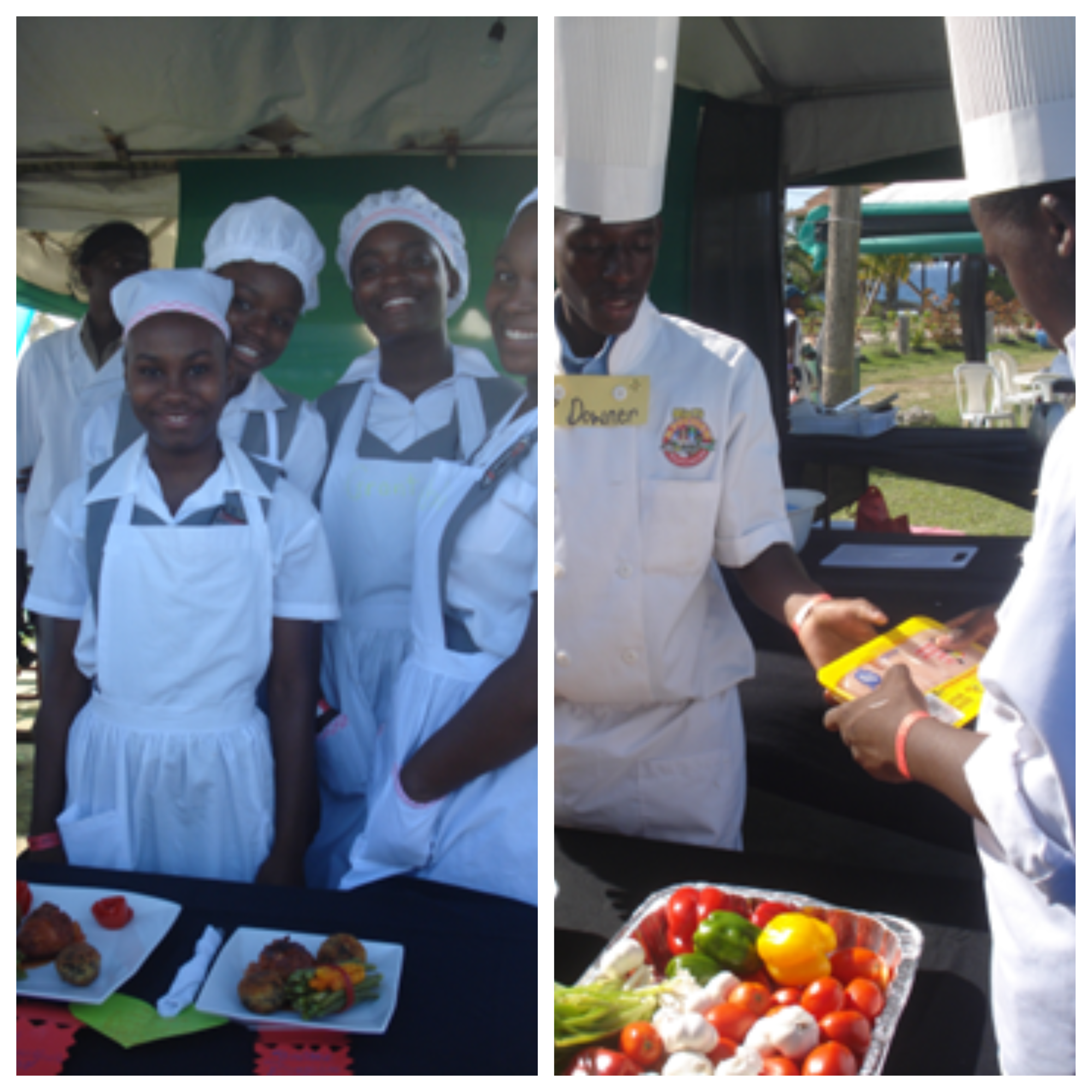
Carlota Morales from Planeterra, a non-profit organization dedicated to improving community tourism, shared insights into community-led travel experiences where agriculture plays a central role. She discussed Planeterra's model of creating economic impact through tourism and highlighted the success stories of community-led agritourism projects. As an exemplar, she cited the "My Cafecito Coffee Tour" in Costa Rica, a flourishing agritourism venture within a cooperative comprising 137 small-scale producers. This project has made a notable impact on the local community, notably in terms of boosting women's employment and fostering environmental conservation.
Closing this panel, Enrique Hennings, Head of Mesoamerica and the Caribbean Hub at IFAD, stressed agritourism's significance for development. He highlighted its role in bridging rural-urban divides, enhancing local assets, and preserving traditions. Mr. Hennings also mentioned innovative projects like mobile cooking schools and culinary events, fostering innovation and job opportunities, especially among rural youth. He elaborated on how IFAD is actively investing in infrastructure, sustainable production, and technology to support agritourism while providing crucial financial and non-financial services to bolster rural areas.
|
A significant highlight of the event was the launch of the IICA's Caribbean Agritourism Network website, a significant stride in enhancing the visibility and accessibility of agritourism in the Caribbean region. |
Launch of the Caribbean Agritourism Network
A significant highlight of the event was the launch of the IICA's Caribbean Agritourism Network website, a significant stride in enhancing the visibility and accessibility of agritourism in the Caribbean region. This platform is designed as a central hub for connecting agritourism enthusiasts, entrepreneurs, and investors, enhancing the sector's visibility and accessibility.
Key features of the website include an interactive map that showcases agritourism enterprises across the Caribbean, making it easier for tourists to discover and engage with these destinations. One of the crucial aspects of the website is its role as a platform to attract funding for agritourism projects in the Caribbean. Additionally, the site offers a wealth of resources such as educational materials, webinars, and training programs, aimed at supporting the growth and success of agritourism entrepreneurs. The website can be accessed through the link: https://agritourism.iica.int/.
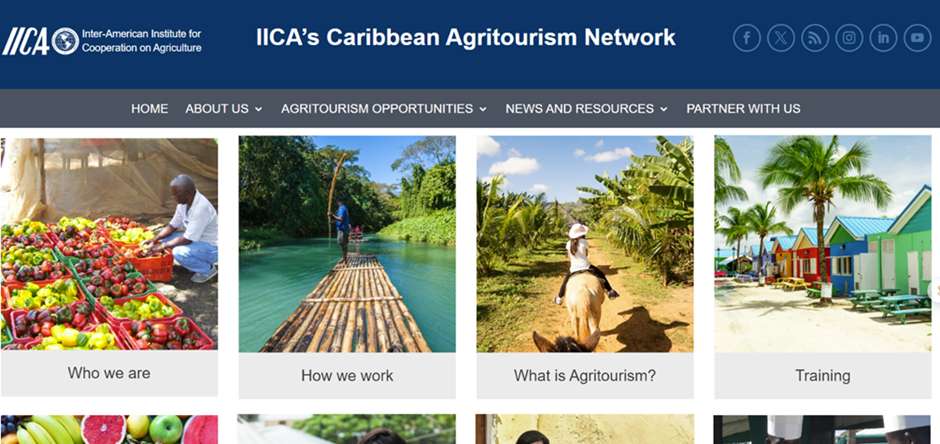
Shaping Agritourism Policy and Catering to Canadian Markets
The second panel focused on "Public Policies for Agritourism and the Demand in the Canadian Market," discussing how public policies can support agritourism initiatives and cater to the Canadian market's demands.
Mariano Villani, President of ALATUR (Latin American Association of Rural Tourism), stressed the empowerment potential of agritourism for rural communities. He emphasized aligning agritourism projects with tourist preferences and transforming small-scale producers into entrepreneurs for sustainable agritourism ventures. He also stressed the importance of retaining rural youth, and promoting local assets, calling for concrete actions to unlock agritourism's full potential.
Diana Palmerin-Velasco, Senior Director at the Canadian Chamber of Commerce, explored agritourism's role in connecting urban and rural Canada. She emphasized its diverse activities, economic benefits, and the growing demand, driven by eco-friendly and health-conscious tourism trends. She also highlighted the growth of indigenous agritourism, fostering cross-cultural understanding and unique cultural experiences.
Roundtable Discussion: Agritourism Insights from SICA Countries
Continuing from the dynamic exchange in Panel 2, the workshop smoothly shifted its focus to regional perspectives with the SICA Roundtable. Titled "Agritourism in Action: A Discussion of Strategies and Insights from SICA Countries," this segment provided a vital opportunity for representatives from Central American nations to present their distinct approaches and experiences in the realm of agritourism.
Jorge Fallas Cascante, representing the Costa Rica Chamber of Rural and Community-based Tourism, shared Costa Rica's approach to agritourism, emphasizing experiences that blend wellness, agriculture, and adventure. He discussed the value chain development in Costa Rica, highlighting the importance of certification programs for ensuring quality in agritourism experiences.
Leonor de Castellanos, from the Association of Small Hotels of El Salvador (HOPES), focused on marketing strategies crucial for agritourism development. She emphasized the role of authentic content in promoting agritourism and the importance of providing genuine experiences that reflect the local culture and people.
Dagmar Moreno Polasek, Coordinator of the Sustainable Tourism Commission of the Guatemalan Exporters Association (COMITURS), discussed the essential ingredients for creating memorable agritourism experiences. He emphasized the importance of planning, consistency in tour experiences, and the integration of gastronomy with tourism for sustainable practices.
Ricardo Koyner, Owner of Café Kotowa in Panama, shared his journey of integrating agritourism into his coffee business, highlighting the challenges and strategies involved in adapting to tourist preferences while maintaining authenticity. Mr. Koyner emphasized the importance of creating connections and experiences for tourists, adapting to their needs and preferences, and maintaining a positive and receptive approach to feedback.
Closing this roundtable, Yira Vermenton, from the Ministry of Tourism of the Dominican Republic, discussed the country's efforts in diversifying its tourism offerings through agritourism. She highlighted successful projects like cocoa farms, coffee routes, honey production, and local handicrafts. These projects empower communities and promote sustainability, aligning with the country's commitment to authentic, locally-rooted experiences.
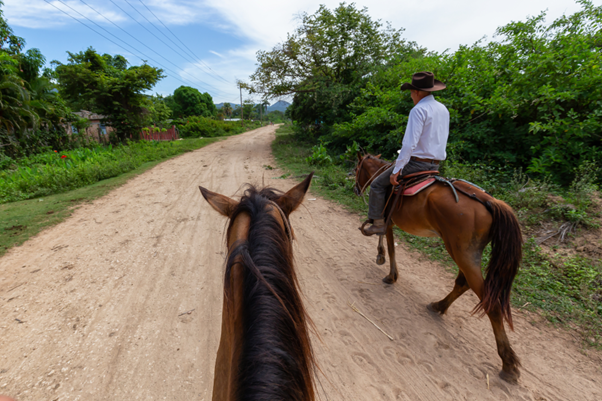
Key Learnings and Future Opportunities in Agritourism
|
Looking ahead, the workshop identified several opportunities for the growth and development of agritourism. These include the need for collaborative efforts among various stakeholders, investments in infrastructure, and the development of supportive policies and training programs. |
The workshop culminated in several key learnings and highlighted future opportunities in the sector. These insights not only reflect the current state of agritourism but also chart a path forward for its development.
One of the primary learnings is the multifaceted nature of agritourism, encompassing a range of activities beyond traditional tourism models. This diversity presents opportunities for economic growth, particularly in rural areas, by creating new employment opportunities and diversifying income sources for farmers and local communities.
The resilience and adaptability of the Caribbean tourism sector, as discussed in the workshop, underscore the potential of agritourism to complement and enhance the region's tourism offerings. Integrating local agriculture with tourism can result in significant benefits for local economies and communities. Community empowerment emerged as a vital theme, with agritourism providing a platform for local communities to showcase their culture, traditions, and culinary expertise.
The discussions highlighted the importance of sustainability in agritourism. Practices that promote environmental conservation, biodiversity, and sustainable agriculture are crucial for the long-term success and impact of agritourism initiatives.
Looking ahead, the workshop identified several opportunities for the growth and development of agritourism. These include the need for collaborative efforts among various stakeholders, investments in infrastructure, and the development of supportive policies and training programs. Additionally, the launch of the Caribbean Agritourism Network website points to the future of agritourism as being increasingly interconnected and accessible. This digital platform paves the way for further collaboration, innovation, and promotion of agritourism in the region.
As we look to the future, this event has served as a catalyst for further exploration and collaboration, ensuring that agritourism continues to thrive and benefit communities and travellers globally.
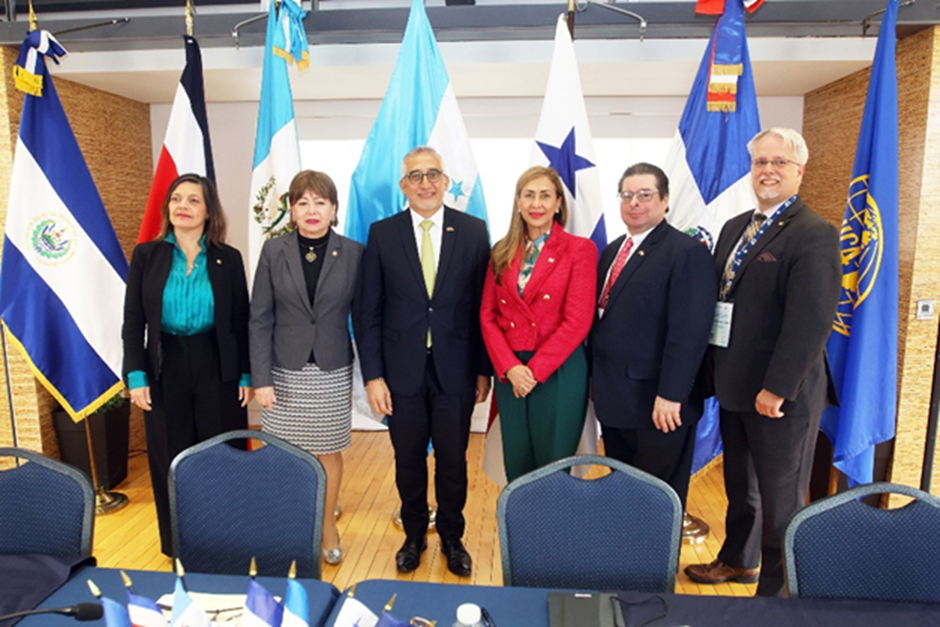
At the event, from left to right: Her Excellency Adriana Solano Laclé, Ambassador of Costa Rica; Her Excellency Guisela Godinez Saz, Ambassador of Guatemala, His Excellency Ricardo Cisneros, Ambassador of El Salvador; Her Excellency Romy Vásquez Morales, Ambassador of Panama; His Excellency Frank Hans Dannenberg Castellanos, Ambassador of the Dominican Republic and Dr. Jean Charles LeVallée, IICA Canada Country Representative
 Vivian Argüelles is a passionate veterinarian dedicated to promoting integration and sustainability of agriculture and livestock systems. She holds a Veterinary Medicine degree from the National Autonomous University of Mexico and is currently pursuing a Ph.D. at McGill University, where she conducts research on sustainable transition pathways in the Mexican beef sector. Since 2022, Vivian is also a valued collaborator at IICA, where she provides technical advice and leads projects related to animal health, sustainable livestock and agritourism.
Vivian Argüelles is a passionate veterinarian dedicated to promoting integration and sustainability of agriculture and livestock systems. She holds a Veterinary Medicine degree from the National Autonomous University of Mexico and is currently pursuing a Ph.D. at McGill University, where she conducts research on sustainable transition pathways in the Mexican beef sector. Since 2022, Vivian is also a valued collaborator at IICA, where she provides technical advice and leads projects related to animal health, sustainable livestock and agritourism.
The opinions expressed in this article are the responsibility of the author and do not necessarily reflect the opinion of IICA.
|
If you have questions or suggestions for improving the BlogIICA, please write to the editors: Joaquín Arias and Eugenia Salazar. |
Add new comment